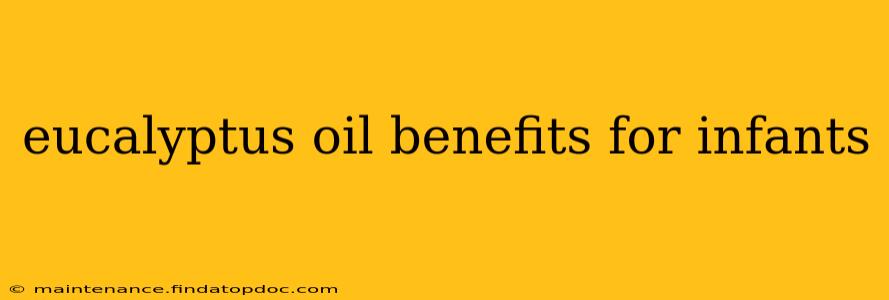Eucalyptus oil, derived from the leaves of the eucalyptus tree, has a long history of use for its medicinal properties. However, its use with infants is a sensitive topic, requiring careful consideration and a nuanced understanding. While eucalyptus oil boasts various potential benefits, it's crucial to understand that its application to infants is generally not recommended due to potential risks. This article delves into the purported benefits, cautions, and safe alternatives for infant care.
Is Eucalyptus Oil Safe for Babies?
This is the most crucial question surrounding eucalyptus oil and infants. The short answer is no, eucalyptus oil is generally not considered safe for use on infants. Their respiratory systems are still developing, making them highly susceptible to the potential irritations and adverse reactions associated with eucalyptus oil. Ingestion can be particularly dangerous.
What are the Potential Risks of Using Eucalyptus Oil on Infants?
Several risks are associated with using eucalyptus oil on infants, including:
- Respiratory irritation: The strong aroma of eucalyptus oil can irritate a baby's delicate airways, potentially triggering coughing, wheezing, or breathing difficulties.
- Allergic reactions: Infants can experience allergic reactions such as skin rashes, hives, or even more serious systemic reactions.
- Toxicity: Ingestion of eucalyptus oil can be toxic to infants, causing serious health consequences. Even topical application can lead to absorption through the skin, raising concerns about toxicity.
- Interaction with medications: Eucalyptus oil can interact with certain medications, potentially leading to adverse effects.
Therefore, it's essential to err on the side of caution and avoid using eucalyptus oil on infants altogether.
What are the Claimed Benefits of Eucalyptus Oil (for Adults, not Infants)?
While we strongly discourage the use of eucalyptus oil on infants, it's important to understand the properties that make it attractive for adult use:
- Decongestant properties: Eucalyptus oil is often touted for its ability to help clear nasal congestion. This is due to its active compounds, such as cineole, which can thin mucus.
- Anti-inflammatory effects: Some studies suggest eucalyptus oil possesses anti-inflammatory properties.
- Antibacterial and antiviral properties: Certain components of eucalyptus oil show antibacterial and antiviral activity in laboratory settings.
Are there Safe Alternatives for Treating Infant Congestion?
Instead of using eucalyptus oil, parents should consider these safe and effective alternatives for treating infant congestion:
- Saline nasal spray or drops: These help to loosen mucus and make it easier to clear from the nasal passages.
- Humidifier: A cool-mist humidifier adds moisture to the air, helping to thin mucus and ease breathing.
- Elevating the head: Slightly elevating your baby's head during sleep can help to drain nasal secretions.
- Hydration: Ensuring your baby is well-hydrated helps to thin mucus.
- Consult a pediatrician: Always seek professional advice from a pediatrician if your infant has respiratory issues or congestion.
How to Treat a Cough in a Baby?
Treating a cough in a baby requires a careful and cautious approach. Never use eucalyptus oil. Instead, focus on supportive measures like those listed above. Contact your pediatrician if the cough is severe, persistent, or accompanied by other symptoms like fever, difficulty breathing, or changes in behavior.
When Should I Call the Doctor About My Baby's Cough or Congestion?
It's important to contact your pediatrician if your baby exhibits any of the following symptoms:
- Difficulty breathing: Rapid breathing, retractions (inward pulling of the skin between the ribs), or flaring nostrils.
- High fever: A fever above 100.4°F (38°C) or persistent fever.
- Persistent cough: A cough that lasts for more than a week or worsens.
- Wheezing: A whistling sound during breathing.
- Lethargy or irritability: Significant changes in your baby's behavior.
- Change in color of mucus: If mucus turns green or yellow.
Remember, this information is for educational purposes only and does not constitute medical advice. Always consult with a pediatrician before using any remedies or treatments for your infant. The safety and well-being of your child are paramount.
